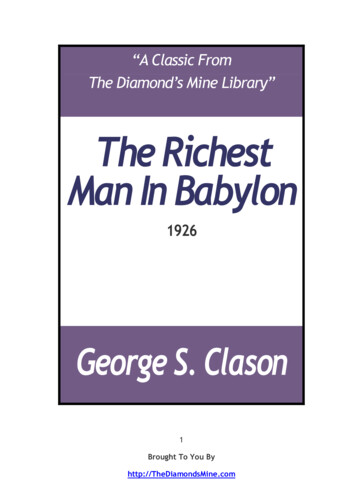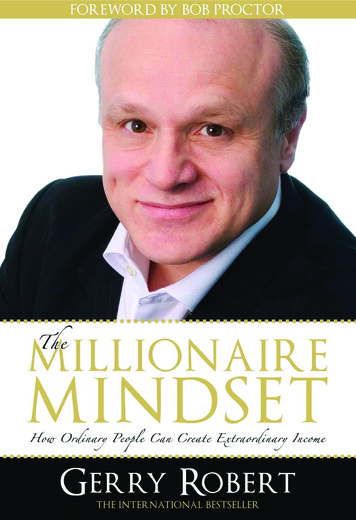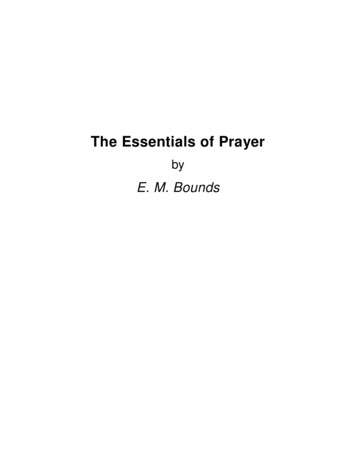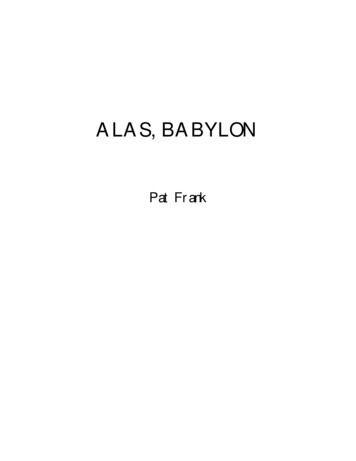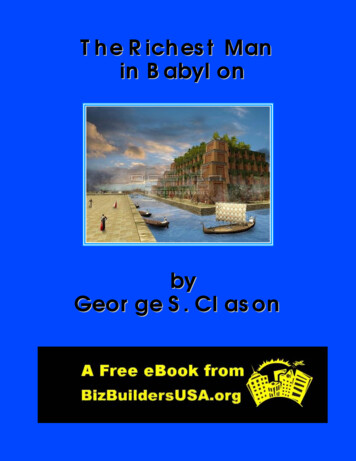
Transcription
The Richest Manin BabylonbyGeorge S. Clason1
The Richest Man in Babylon by George S. ClasonTABLE OF CONTENTSFirst Published in 1926.Table of ContentsAbout the author .3Foreword .5An Historical Sketch of Babylon .6The Man Who Desired Gold .9The Richest Man in Babylon .12Seven Cures For a Lean Purse.17THE FIRST CURE.18Start thy purse to fattening .18THE SECOND CURE .19Control thy expenditures.19THE THIRD CURE.20Make thy gold multiply.20THE FOURTH CURE.21Guard thy treasures from loss.21THE FIFTH CURE.22Make of thy dwelling a profitable investment .22THE SIXTH CURE.23Insure a future income .23THE SEVENTH CURE.24Increase thy ability to earn .24Meet the Goddess of Good Luck .26The Five Laws of Gold .32THE FIVE LAWS OF GOLD .34The First Law of Gold .36The Second Law of Gold .36The Third Law of Gold .36The Fourth Law of Gold .37The Fifth Law of Gold .37The Gold Lender of Babylon .38The Walls of Babylon.44The Camel Trader of Babylon .46The Clay Tablets From Babylon .51Tablet No. I .52Tablet No. II .52Tablet No. III .53Tablet No. IV .53Tablet No. V .54The Luckiest Man in Babylon .582
Ahead of you stretches your future like a road leading into the distance. Along that road are ambitionsyou wish to accomplish . . . desires you wish to gratify.To bring your ambitions and desires to fulfillment, you must be successful with money. Use thefinancial principles made clear in the pages which follow. Let them guide you away from thestringencies of a lean purse to that fuller, happier life a full purse makes possible.Like the law of gravity, they are universal and unchanging. May they prove for you, as they haveproven to so many others, a sure key to a fat purse, larger bank balances and gratifying financialprogress.LO, MONEY IS PLENTIFULFOR THOSE WHO UNDERSTANDTHE SIMPLE RULES OF ITS ACQUISITION1.2.3.4.5.6.7.Start thy purse to fatteningControl thy expendituresMake thy gold multiplyGuard thy treasures from lossMake of thy dwelling a profitable investmentInsure a future incomeIncrease thy ability to earnAbout the authorGEORGE SAMUEL CLASON was born in Louisiana, Missouri, on November 7, 1874. Heattended the University of Nebraska and served in the United States Army during the SpanishAmerican War. Beginning a long career in publishing, he founded the Clason Map Company of Denver,Colorado, and published the first road atlas of the United States and Canada. In 1926, he issued thefirst of a famous series of pamphlets on thrift and financial success, using parables set in ancientBabylon to make each of his points. These were distributed in large quantities by banks andinsurance companies and became familiar to millions, the most famous being "The Richest Manin Babylon," the parable from which the present volume takes its title. These "Babylonian parables"have become a modern inspirational classic.3
ForewordOur prosperity as a nation depends upon the personal financial prosperity of each of us asindividuals.This book deals with the personal successes of each of us. Success means accomplishments as theresult of our own efforts and abilities. Proper preparation is the key to our success. Our actscan be no wiser than our thoughts. Our thinking can be no wiser than our understanding.This book of cures for lean purses has been termed a guide to financial understanding. That, indeed, isits purpose: to offer those who are ambitious for financial success an insight which will aidthem to acquire money, to keep money and to make their surpluses earn more money.In the pages which follow, we are taken back to Babylon, the cradle in which was nurtured thebasic principles of finance now recognized and used the world over.To new readers the author is happy to extend the wish that its pages may contain for them the sameinspiration for growing bank accounts, greater financial successes and the solution of difficultpersonal financial problems so enthusiastically reported by readers from coast to coast.To the business executives who have distributed these tales in such generous quantities to friends,relatives, employees and associates, the author takes this opportunity to express his gratitude. Noendorsement could be higher than that of practical men who appreciate its teachings because they,themselves, have worked up to important successes by applying the very principles it advocates.Babylon became the wealthiest city of the ancient world because its citizens were the richestpeople of their time. They appreciated the value of money. They practiced sound financial principlesin acquiring money, keeping money and making their money earn more money. They provided forthemselves what we all desire . . . incomes for the future.G. S. C.4
An Historical Sketch of BabylonIn the pages of history there lives no city more glamorous than Babylon. Its very name conjuresvisions of wealth and splendor. Its treasures of gold and jewels were fabulous. One naturally picturessuch a wealthy city as located in a suitable setting of tropical luxury, surrounded by rich naturalresources of forests, and mines. Such was not the case. It was located beside the Euphrates River, in aflat, arid valley. It had no forests, no mines—not even stone for building. It was not even located upona natural trade-route. The rainfall was insufficient to raise crops.Babylon is an outstanding example of man's ability to achieve great objectives, using whatevermeans are at his disposal. All of the resources supporting this large city were man-developed. All of itsriches were man-made.Babylon possessed just two natural resources—a fertile soil and water in the river. With one ofthe greatest engineering accomplishments of this or any other day, Babylonian engineers diverted thewaters from the river by means of dams and immense irrigation canals. Far out across that arid valleywent these canals to pour the life giving waters over the fertile soil. This ranks among the firstengineering feats known to history. Such abundant crops as were the reward of this irrigation systemthe world had never seen before.Fortunately, during its long existence, Babylon was ruled by successive lines of kings to whomconquest and plunder were but incidental. While it engaged in many wars, most of these were local ordefensive against ambitious conquerors from other countries who coveted the fabulous treasures ofBabylon. The outstanding rulers of Babylon live in history because of their wisdom, enterprise andjustice. Babylon produced no strutting monarchs who sought to conquer the known world that allnations might pay homage to their egotism.As a city, Babylon exists no more. When those energizing human forces that built andmaintained the city for thousands of years were withdrawn, it soon became a deserted ruin. The site ofthe city is in Asia about six hundred miles east of the Suez Canal, just north of the Persian Gulf. Thelatitude is about thirty degrees above the Equator, practically the same as that of Yuma, Arizona. Itpossessed a climate similar to that of this American city, hot and dry.Today, this valley of the Euphrates, once a populous irrigated farming district, is again a windswept arid waste. Scant grass and desert shrubs strive for existence against the windblown sands. Goneare the fertile fields, the mammoth cities and the long caravans of rich merchandise. Nomadic bands ofArabs, securing a scant living by tending small herds, are the only inhabitants. Such it has been sinceabout the beginning of the Christian era.Dotting this valley are earthen hills. For centuries, they were considered by travelers to benothing else. The attention of archaeologists were finally attracted to them because of broken pieces ofpottery and brick washed down by the occasional rain storms. Expeditions, financed by European andAmerican museums, were sent here to excavate and see what could be found. Picks and shovels soonproved these hills to be ancient cities. City graves, they might well be called.Babylon was one of these. Over it for something like twenty centuries, the winds had scatteredthe desert dust. Built originally of brick, all exposed walls had disintegrated and gone back to earthonce more. Such is Babylon, the wealthy city, today. A heap of dirt, so long abandoned that no livingperson even knew its name until it was discovered by carefully removing the refuse of centuries fromthe streets and the fallen wreckage of its noble temples and palaces.Many scientists consider the civilization of Babylon and other cities in this valley to be theoldest of which there is a definite record. Positive dates have been proved reaching back 8000 years.An interesting fact in this connection is the means used to determine these dates. Uncovered in the5
ruins of Babylon were descriptions of an eclipse of the sun. Modern astronomers readily computed thetime when such an eclipse, visible in Babylon, occurred and thus established a known relationshipbetween their calendar and our own.In this way, we have proved that 8000 years ago, the Sumerites, who inhabited Babylonia, wereliving in walled cities. One can only conjecture for how many centuries previous such cities hadexisted. Their inhabitants were not mere barbarians living within protecting walls. They were aneducated and enlightened people. So far as written history goes, they were the first engineers, the firstastronomers, the first mathematicians, the first financiers and the first people to have a writtenlanguage.Mention has already been made of the irrigation systems which transformed the arid valley intoan agricultural paradise. The remains of these canals can still be traced, although they are mostly filledwith accumulated sand. Some of them were of such size that, when empty of water, a dozen horsescould be ridden abreast along their bottoms. In size they compare favorably with the largest canals inColorado and Utah.In addition to irrigating the valley lands, Babylonian engineers completed another project ofsimilar magnitude. By means of an elaborate drainage system they reclaimed an immense area ofswamp land at the mouths of the Euphrates and Tigris Rivers and put this also under cultivation.Herodotus, the Greek traveler and historian, visited Babylon while it was in its prime and hasgiven us the only known description by an outsider. His writings give a graphic description of the cityand some of the unusual customs of its people. He mentions the remarkable fertility of the soil and thebountiful harvest of wheat and barley which they produced.The glory of Babylon has faded but its wisdom has been preserved for us. For this we areindebted to their form of records. In that distant day, the use of paper had not been invented. Instead,they laboriously engraved their writing upon tablets of moist clay. When completed, these were bakedand became hard tile. In size, they were about six by eight inches, and an inch in thickness.These clay tablets, as they are commonly called, were used much as we use modern forms ofwriting. Upon them were engraved legends, poetry, history, transcriptions of royal decrees, the laws ofthe land, titles to property, promissory notes and even letters which were dispatched by messengers todistant cities. From these clay tablets we are permitted an insight into the intimate, personal affairs ofthe people. For example, one tablet, evidently from the records of a country storekeeper, relates thatupon the given date a certain named customer brought in a cow and exchanged it for seven sacks ofwheat, three being delivered at the time and the other four to await the customer's pleasure.Safely buried in the wrecked cities, archaeologists have recovered entire libraries of thesetablets, hundreds of thousands of them.One of the outstanding wonders of Babylon was the immense walls surrounding the city. Theancients ranked them with the great pyramid of Egypt as belonging to the "seven wonders of theworld." Queen Semiramis is credited with having erected the first walls during the early history of thecity. Modern excavators have been unable to find any trace of the original walls. Nor is their exactheight known. From mention made by early writers, it is estimated they were about fifty to sixty feethigh, faced on the outer side with burnt brick and further protected by a deep moat of water.The later and more famous walls were started about six hundred years before the time of Christby King Nabopolassar. Upon such a gigantic scale did he plan the rebuilding, he did not live to see thework finished. This was left to his son, Nebuchadnezzar, whose name is familiar in Biblical history.The height and length of these later walls staggers belief. They are reported upon reliableauthority to have been about one hundred and sixty feet high, the equivalent of the height of a modernfifteen story office building. The total length is estimated as between nine and eleven miles. So widewas the top that a six-horse chariot could be driven around them. Of this tremendous structure, little6
now remains except portions of the foundations and the moat. In addition to the ravages of theelements, the Arabs completed the destruction by quarrying the brick for building purposes elsewhere.Against the walls of Babylon marched, in turn, the victorious armies of almost every conquerorof that age of wars of conquest. A host of kings laid siege to Babylon, but always in vain. Invadingarmies of that day were not to be considered lightly. Historians speak of such units as 10,000 horsemen,25,000 chariots, 1200 regiments of foot soldiers with 1000 men to the regiment. Often two or threeyears of preparation would be required to assemble war materials and depots of food along theproposed line of march.The city of Babylon was organized much like a modern city. There were streets and shops.Peddlers offered their wares through residential districts. Priests officiated in magnificent temples.Within the city was an inner enclosure for the royal palaces. The walls about this were said to havebeen higher than those about the city.The Babylonians were skilled in the arts. These included sculpture, painting, weaving, goldworking and the manufacture of metal weapons and agricultural implements. Their Jewelers createdmost artistic jewelry. Many samples have been recovered from the graves of its wealthy citizens andare now on exhibition in the leading museums of the world.At a very early period when the rest of the world was still hacking at trees with stone-headedaxes, or hunting and fighting with flint-pointed spears and arrows, the Babylonians were using axes,spears and arrows with metal heads.The Babylonians were clever financiers and traders. So far as we know, they were the originalinventors of money as a means of exchange, of promissory notes and written titles to property.Babylon was never entered by hostile armies until about 540 years before the birth of Christ.Even then the walls were not captured. The story of the fall of Babylon is most unusual. Cyrus, one ofthe great conquerors of that period, intended to attack the city and hoped to take its impregnable walls.Advisors of Nabonidus, the King of Babylon, persuaded him to go forth to meet Cyrus and give himbattle without waiting for the city to be besieged. In the succeeding defeat to the Babylonian army, itfled away from the city. Cyrus, thereupon, entered the open gates and took possession withoutresistance.Thereafter the power and prestige of the city gradually waned until, in the course of a fewhundred years, it was eventually abandoned, deserted, left for the winds and storms to level once againto that desert earth from which its grandeur had originally been built. Babylon had fallen, never to riseagain, but to it civilization owes much.The eons of time have crumbled to dust the proud walls of its temples, but the wisdom ofBabylon endures.Money is the medium by which earthly success is measured.Money makes possible the enjoyment of the best the earth affords.Money is plentiful for those who understand the simple laws which govern itsacquisition.Money is governed today by the same laws which controlled it when prosperous menthronged the streets of Babylon, six thousand years ago.7
The Man Who Desired GoldBansir, the chariot builder of Babylon, was thoroughly discouraged. From his seat upon the lowwall surrounding his property, he gazed sadly at his simple home and the open workshop in whichstood a partially completed chariot.His wife frequently appeared at the open door. Her furtive glances in his direction remindedhim that the meal bag was almost empty and he should be at work finishing the chariot, hammering andhewing, polishing and painting, stretching taut the leather over the wheel rims, preparing it for deliveryso he could collect from his wealthy customer.Nevertheless, his fat, muscular body sat stolidly upon the wall. His slow mind was strugglingpatiently with a problem for which he could find no answer. The hot, tropical sun, so typical of thisvalley of the Euphrates, beat down upon him mercilessly. Beads of perspiration formed upon his browand trickled down unnoticed to lose themselves in tie hairy jungle on his chest.Beyond his home towered the high terraced wall surrounding the king's palace. Nearby,cleaving the blue heavens, was the painted tower of the Temple of Bel. In the shadow of such grandeurwas his simple home and many others far less neat and well cared for. Babylon was like this—amixture of grandeur and squalor, of dazzling wealth and direst poverty, crowded together without planor system within the protecting walls of the city.Behind him, had he cared to turn and look, the noisy chariots of the rich jostled and crowdedaside the sandaled tradesmen as well as the barefooted beggars. Even the rich were forced to turn intothe gutters to clear the way for the long lines of slave water carriers, on the "King's Business," 15eachbearing a heavy goatskin of water to be poured upon the hanging gardens.Bansir was too engrossed in his own problem to hear or heed the confused hubbub of the busycity. It was the unexpected twanging of the strings from a familiar lyre that aroused him from hisreverie. He turned and looked into the sensitive, smiling face of his best friend—Kobbi, the musician."May the Gods bless thee with great liberality, my good friend," began Kobbi with an elaboratesalute. "Yet, it does appear they have already been so generous thou needest not to labor. I rejoice withthee in thy good fortune. More, I would even share it with thee. Pray, from thy purse which must bebulging else thou wouldst be busy in your shop, extract but two humble shekels and lend them to meuntil after the noblemen's feast this night. Thou wilt not miss them ere they are returned.""If I did have two shekels," Bansir responded gloomily, "to no one could I lend them—not evento you, my best of friends; for they would be my fortune—my entire fortune. No one lends his entirefortune, not even to his best friend.""What," exclaimed Kobbi with genuine surprise, "Thou hast not one shekel in thy purse, yet sitlike a statue upon a wall! Why not complete that chariot? How else canst thou provide for thy nobleappetite? Tis not like thee, my friend. Where is thy endless energy? Doth something distress thee? Havethe Gods brought to thee troubles?""A torment from the Gods it must be," Bansir agreed. "It began with a dream, a senselessdream, in which I thought I was a man of means. From my belt hung a handsome purse, heavy withcoins. There were shekels which I cast with careless freedom to the beggars; there were pieces of silverwith which I did buy finery for my wife and whatever I did desire for myself; there were pieces of goldwhich made me feel assured of the future and unafraid to spend the silver. A glorious feeling ofcontentment was within me! You would not have known me for thy hardworking friend. Nor wouldsthave known my wife, so free from wrinkles was her face and shining with happiness. She was again thesmiling maiden of our early married days."8
"A pleasant dream, indeed," commented Kobbi, "but why should such pleasant feelings as itaroused turn thee into a glum statue upon the wall?""Why, indeed! Because when I awoke and remembered how empty was my purse, a feeling ofrebellion swept over me. Let us talk it over together, for, as the sailors do say, we ride in the same boat,we two. As youngsters, we went together to the priests to learn wisdom. As young men, we shared eachother's pleasures. As grown men, we have always been close friends. We have been contented subjectsof our kind. We have been satisfied to work long hours and spend our earnings freely. We have earnedmuch coin in the years that have passed, yet to know the joys that come from wealth, we must dreamabout them. Bah! Are we more than dumb sheep? We live in the richest city in all the world. Thetravelers do say none equals it in wealth. About us is much display of wealth, but of it we ourselveshave naught. After half a lifetime of hard labor, thou, my best of friends, hast an empty purse and sayestto me, "May I borrow such a trifle as two shekels until after the noblemen's feast this night?" Then,what do I reply? Do I say, "Here is my purse; its contents will I gladly share?' No, I admit that my purseis as empty as thine. What is the matter? Why cannot we acquire silver and gold—more than enoughfor food and robes?"Consider, also, our sons," Bansir continued, "are they not 17following in the footsteps of theirfathers? Need they and their families and their sons and their sons' families live all their lives in themidst of such treasurers of gold, and yet, like us, be content to banquet upon sour goat's milk andporridge?""Never, in all the years of our friendship, didst thou talk like this before, Bansir." Kobbi waspuzzled."Never in all those years did I think like this before. From early dawn until darkness stoppedme, I have labored to build the finest chariots any man could make, soft- heartedly hoping some day theGods would recognize my worthy deeds and bestow upon me great prosperity. This they have neverdone. At last, I realize this they will never do. Therefore, my heart is sad. I wish to be a man of means. Iwish to own lands and cattle, to have fine robes and coins in my purse. I am willing to work for thesethings with all the strength in my back, with all the skill in my hands, with all the cunning in my mind,but I wish my labors to be fairly rewarded. What is the matter with us? Again I ask you! Why cannotwe have our just share of the good things so plentiful for those who have the gold with which to buythem?""Would I knew an answer!" Kobbi replied. "No better than thou am I satisfied. My earningsfrom my lyre are quickly gone. Often must I plan and scheme that my family be not hungry. Also,within my breast is a deep longing for a lyre large enough that it may truly sing the strains of music thatdo surge through my mind. With such an instrument could I make music finer than even the king hasheard before.""Such a lyre thou shouldst have. No man in all Babylon could make it sing more sweetly; couldmake it sing so sweetly, not only the king but the Gods themselves would be delighted. But how mayestthou secure it while we both of us are as poor as the king's slaves? Listen to the bell! Here they come."He pointed to the long column of half naked, sweating water bearers plodding laboriously up thenarrow street from the river. Five abreast they marched, each bent under a heavy goatskin of water."A fine figure of a man, he who doth lead them." Kobbi indicated the wearer of the bell whomarched in front without a load. "A prominent man in his own country, 'tis easy to see.""There are many good figures in the line," Bansir agreed, "as good men as we. Tall, blond menfrom the north, laughing black men from the south, little brown men from the nearer countries. Allmarching together from the river to the gardens, back and forth, day after day, year after year. Naughtof happiness to look forward to. Beds of straw upon which to sleep—hard grain porridge to eat. Pity thepoor brutes, Kobbi!"9
"Pity them I do. Yet, thou dost make me see how little better off are we, free men though wecall ourselves."That is truth, Kobbi, unpleasant thought though it be. We do not wish to go on year after yearliving slavish lives. Working, working, working! Getting nowhere.""Might we not find out how others acquire gold and do as they do?" Kobbi inquired.“Perhaps there is some secret we might learn if we but sought from those who knew," repliedBansir thoughtfully.“This very day,” suggested Kobbi, "I did pass our old friend, Arkad, riding in his goldenchariot. This I will say, he did not look over my humble head as many in his station might consider hisright. Instead, he did wave his hand that all onlookers might see him pay greetings and bestow his smileof friendship upon Kobbi, the musician.""He is claimed to be the richest man in all Babylon," Bansir mused."So rich the king is said to seek his golden aid in affairs of the treasury," Kobbi replied. "Sorich," Bansir interrupted, "I fear if I should meet him in the darkness of the night, I should lay myhands upon his fat wallet""Nonsense," reproved Kobbi, "a man's wealth is not in the purse he carries. A fat purse quicklyempties if there be no golden stream to refill it. Arkad has an income that constantly keeps his pursefull, no matter how liberally he spends.""Income, that is the thing," ejaculated Bansir. "I wish an income that will keep flowing into mypurse whether I sit upon the wall or travel to far lands. Arkad must know how a man can make anincome for himself. Dost suppose it is something he co
To bring your ambitions and desires to fulfillment, you must be successful with money. Use the financial principles made clear in the pages which follow. Let them guide you away from the stringencies of a lean purse to that fuller, happier life a full purse makes possible. Li

